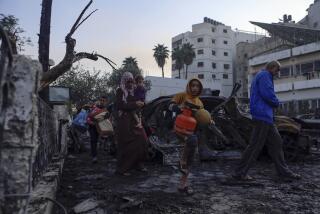President Defends U.S. Interest, Role in Kosovo
- Share via
WASHINGTON — President Clinton on Wednesday defended the budding U.S. role in Kosovo, saying Washington has both a humanitarian interest in the strife-torn province and “a direct interest in whether there is instability in the Balkans.”
Discussing another global hot spot, the president said the United States has not abandoned the hope of restoring U.N. inspections of Iraqi weapons-production sites.
Speaking hours after U.S. and British warplanes flying over Iraq struck targets on the outskirts of Baghdad, he said the Western-imposed “no-fly” zones over Iraq’s north and south must continue to be patrolled.
Allied pilots come under attack there from “time to time,” he said, because Iraqi gunners are seeking “the symbolic victory of shooting one of these planes down and perhaps trying to intimidate us.”
Clinton’s second extended encounter with reporters in six days took place during a joint news conference with Ghanaian President Jerry J. Rawlings.
Serbs remain resolutely opposed to the deployment of a 28,000-member peacekeeping mission led by the North Atlantic Treaty Organization, including about 4,000 Americans, in the separatist Serbian province. Serbian and ethnic Albanian negotiators have agreed to resume talks March 15 in France.
“Does the United States have an immediate, selfish interest in what happens on some lonely road in Kosovo to some poor farm family driving a wagon with horses that are underfed because they haven’t been able to get food?” Clinton asked rhetorically.
“No,” he replied. “I would argue we have a humanitarian interest.”
He was responding to an argument, made Monday by former Secretary of State Henry A. Kissinger in a column in the Washington Post, that “Kosovo is no more a threat to America than Haiti was to Europe--and we never asked for NATO support there. The nearly 300 million Europeans should be able to generate the ground forces to deal with 2.3 million Kosovars.”
The president also defended the decision made Saturday--when the Serbian and ethnic Albanian delegations at talks outside Paris sought more negotiating time--to extend a deadline that, fewer than 24 hours earlier, he had said was firm.
“We were basically agreeing to what both parties wished to do,” he said, because the negotiators said they had reached a stalemate.
Generally subdued, occasionally joking, Clinton continued to present a more public side to his presidency in the aftermath of impeachment.
He put a positive face on his meeting a day earlier with Democratic and Republican congressional leaders despite efforts by House Speaker J. Dennis Hastert (R-Ill.) and Senate Majority Leader Trent Lott (R-Miss.) to avoid declaring specifically that they trust the president.
“Because of what they went through with their own members, that’s a difficult question for you to ask them,” he told reporters. “And no matter what answer they give, it causes them more problems than it solves. You guys are great at asking me those questions too.
“Their feelings are not important here, just like my feelings are not important,” he said. “We have an oath to fulfill, a responsibility to fulfill. We were hired to do the public’s business, and they expect us to do it.”
More to Read
Sign up for Essential California
The most important California stories and recommendations in your inbox every morning.
You may occasionally receive promotional content from the Los Angeles Times.













